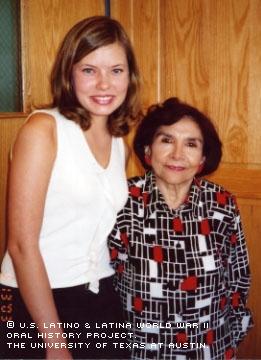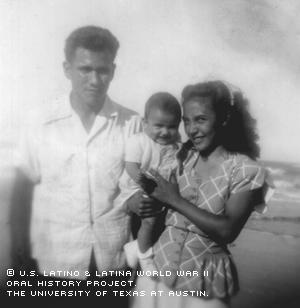

By Jennifer Lindgren
These are some things Virgina Gallardo Nuñez remembers about growing up in South Texas during World War II: curling her hair with the string ties from coffee bags instead of bobby pins because metal was rationed; huddling close to the family radio, listening to war-news updates and Glenn Miller, her favorite singer; and attending midnight Mass on Christmas Eve to pray for her three brothers at war, before having her mother's delicious homemade tamales for Christmas dinner.
Born May 21, 1930, in Brownsville, Texas, Nuñez was only a child at the outbreak of World War II in 1941. By then, her family had moved to nearby San Benito, from where she watched the war from home with her mother and sisters, since her three older brothers served in the military: the oldest was in Germany, another in a submarine and a third with the Army in Italy.
"Whenever we got a letter, we got so happy! We'd all cheer and mama would pass the letter around to everybody," Nuñez said.
Sugar, rubber and metal were virtually unavailable, as the military got first priority with these supplies. Nuñez’s family traveled across the border to Mexico to buy sugar, where it was readily available. She says she didn’t like the adjustments she had to make, but knew it was for the soldiers. The entire country pulled together.
"People understood about the war," Nuñez said. "It taught us to persevere; to be more patient, to be more cooperative, to be more kind with each other; to try to make life as easy as possible for each other."
Nuñez, her mother and her sisters worked to support the family while the men were at war. She recalls having several jobs during the war years: in a dime store, as a babysitter and as a waitress with her stepsister at the biggest restaurant in town. She recalls hearing only about the war when she was at school.
Nuñez attended Saint Benedict Catholic School in San Benito. She stayed to help the nuns after classes and says she admired the peaceful lives they lived. During the war, her family went to church daily and prayed for the troops.
"Oh, we were faithful!" said Nuñez, noting that she developed a strong sense of spirituality and closeness to God.
Young Nuñez wrote to her older brother and told him she wanted to be a nun, but he insisted she marry instead.
"I don't know why he did not want me to become a nun,'' she said. "But I said, 'Let your will be done, Lord.'"
She corresponded with Rudolfo "Rudy" Nuñez, a friend from San Benito who was fighting in Germany. As they wrote letters back and forth, Rudy began courting her and even proposed marriage. She responded that they should wait until he returned from Germany. When Rudy came home in 1945, Nuñez left school after her sophomore year and married him when she was 17.
When the war ended, she and her family were living in Brownsville again. Her brother, Peter, was the first to come home, and a huge celebration followed. Soon after, her oldest brother returned to his wife and children. Her youngest brother stayed in the Army and made the military his career.
After the war, life went on as it had been for her family; however, Rudy didn’t easily overcome the effects of the war. He’d fought in the Battle of the Bulge in Germany, and suffered his entire life from "shell shock," now called Post Traumatic Stress Syndrome. At times, he drank and cried, Nuñez says.
"He did talk about the war, but said he never forgave himself for killing all the Germans," she recalled. "I told him it wasn't his fault; that he should forgive himself."
Nuñez says she learned much about the war from Rudy.
"My husband was very proud of his country," she recalled. "He said we should all serve our country, and taught our kids to do the same."
Nuñez says her mother taught her to stand up for her rights: to respect others, but not let anyone put her down.
"There used to be something of rejection that you'd feel because you weren't an Anglo," she said. "Now I don't feel that anymore. I think that the Lord is doing his job. You have to let his will be done, not yours. He's got a plan."
Growing up during WWII taught her to respect and have faith in the people in her life who always looked out for her, Nuñez says.
"War is awful. Sometimes we have to remember so we can appreciate our country and soldiers, and our freedom. Sometimes we think we know it all; we don't," Nuñez said. "Every day I'm learning!"
Mrs. Nuñez was interviewed in Brownsville, Texas, on September 13, 2003, by Jennifer Lindgren.

